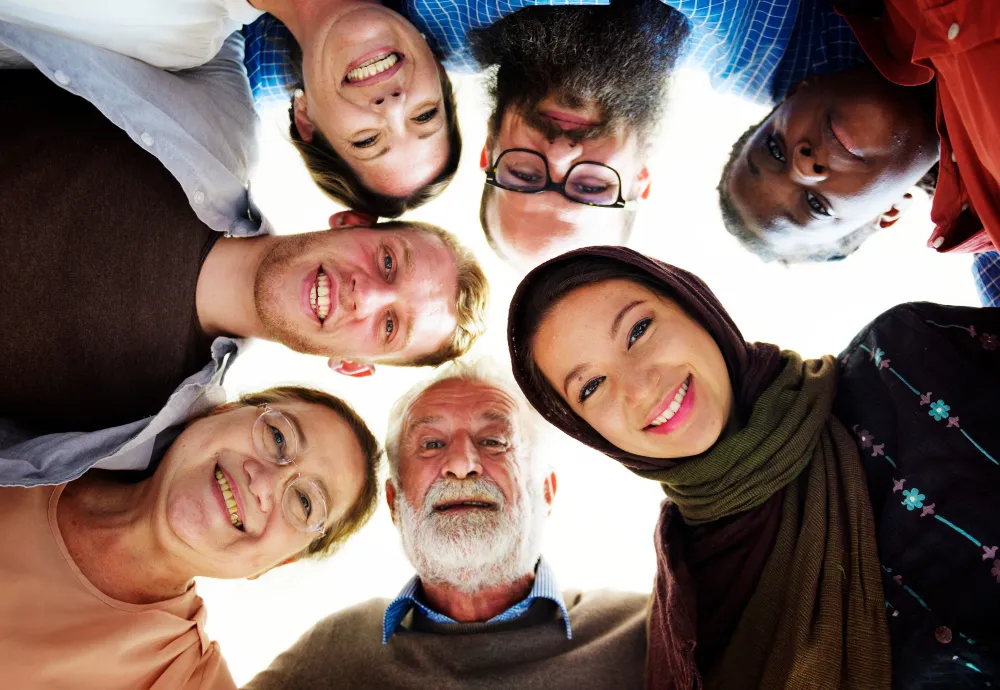The Art of Goodbye: Mastering the Bittersweet Farewells
 Nifty Nomad
Nifty NomadTable of contents
- Importance of connections made in a place
- Acknowledging the emotional toll of leaving
- The stages of grief
- The importance of recognizing and validating your feelings
- The role of technology in maintaining relationships
- Suggestions for platforms and methods to stay in touch
- The benefits of journaling for emotional processing
- Tips and prompts for effective reflection
- The positive impact of gratitude on mental health
- Techniques for practicing gratitude
- The value of focusing on the future
- Suggestions for researching and planning for the next location
- Importance of seeking help when feelings are overwhelming
- Resources for support

The life of a digital nomad often conjures images of idyllic beaches, bustling cityscapes, and an adventurous lifestyle driven by freedom and spontaneity. As appealing as this may sound, beneath the sunsets and laptop screens, there lies an undercurrent of emotional challenges that is rarely spoken about - the continuous cycle of forming attachments and then having to say goodbye.

Digital nomads, constantly uprooting their lives and moving from place to place, inevitably form deep connections with people and locales they encounter on their journey. These connections, although temporary, enrich their experiences, shape their perspectives, and create a tapestry of global friendships and memories.
However, these bonds also carry the emotional weight of farewells, making departures not just about hopping onto the next flight, but also about navigating through a complex web of emotions.
In this blog post, we delve into this seldom-explored aspect of the digital nomad lifestyle - the emotional toll of goodbyes. We aim to provide guidance and practical strategies to help digital nomads acknowledge, process, and manage these feelings, transforming them into a source of personal growth and resilience.
Whether you're a seasoned nomad or someone considering this lifestyle, this exploration of the emotional landscape of goodbyes will equip you with valuable insights for your journey ahead.
Living the nomadic lifestyle isn't just about working from a beachside café or exploring ancient ruins during your lunch break. It's also about the emotional bonds you form with the people you meet and the places you live. This emotional investment – the friendships you forge, the local customs you adopt, and the comfort you find in a once-foreign neighborhood – adds depth and richness to your nomadic journey. But it also amplifies the difficulty of leaving. Recognizing this emotional investment is the first, crucial step in dealing with the inevitable goodbyes that define the rhythm of the digital nomad lifestyle.
Importance of connections made in a place
Building connections with a place and its people is a transformative aspect of the digital nomad experience. These connections do more than simply make a new location feel like home. They enrich your journey by fostering cultural understanding, broadening your perspective, and offering opportunities for personal growth.

The bonds formed with locals go beyond simple friendship. They introduce you to unique traditions, customs, and ways of life, fostering a deeper appreciation for the diverse world we inhabit. This cultural exchange is not just enlightening; it's also humbling and inspiring, offering invaluable lessons about tolerance, acceptance, and resilience.
Each relationship you build contributes to a global network, bridging gaps between cultures and nations. These networks often lead to opportunities both personal and professional, from collaborative projects to invitations to local gatherings. These shared experiences contribute to your growth as a global citizen, helping you understand and navigate the nuances of our interconnected world.
The connections you make offer a sense of belonging. They ground your experience and infuse your nomadic journey with a sense of purpose and fulfillment. A local barista's friendly smile, a neighbor's invitation for a local meal, or a shared laugh with friends at a community event; these moments of connection create a tapestry of memories that transform a physical location into a cherished experience.
In essence, the importance of making connections in a place goes beyond the immediate comfort they provide. They enhance your nomadic journey by providing cultural insight, opportunities for growth, and a sense of global community, making each new location not just a place to live, but a place to learn, grow, and belong.
However, the depth and intensity of these connections also make the inevitable departure difficult. When you connect deeply with a place, leaving it behind can feel like leaving a piece of your heart. That's why acknowledging the importance of these connections, and the impact their loss can have, is essential to managing the emotional side of the nomadic lifestyle.
Acknowledging the emotional toll of leaving
A common, yet under-addressed aspect of the digital nomad lifestyle, is the emotional toll of saying goodbye. Each departure isn't just a change in physical location; it's a farewell to the bonds forged, the familiarity nurtured, and the experiences shared. Each time you pack your bags, you're not just leaving a place, but also the connections that added depth to your time spent there.

The emotional impact of this can be considerable. Feelings of sadness, loss, or loneliness can surface as you uproot yourself from one place to move on to the next. You might experience a sense of grief over leaving behind friendships, local communities, and a sense of belonging that you've spent weeks or months cultivating. These feelings are a normal part of the process, a testament to the depth of your experiences and connections.
Acknowledging this emotional toll is critical. Dismissing or suppressing these feelings can lead to increased stress, burnout, or emotional fatigue. Instead, it's important to allow yourself to experience and express these emotions. Validating your feelings is the first step towards dealing with them in a healthy way. By acknowledging the emotional toll of leaving, you are recognizing the importance of your connections, and giving yourself permission to grieve their loss, which is an essential step towards healing and moving forward.
Recognizing the emotional toll of departure also means appreciating the vulnerability it involves. As digital nomads, we choose a lifestyle that is inherently transient, which repeatedly exposes us to the cycle of connection and disconnection. It's a constant dance of hellos and goodbyes, which can sometimes leave us feeling emotionally raw. This vulnerability, while challenging, can also be a powerful catalyst for personal growth. It teaches us about our emotional resilience, our ability to form meaningful relationships quickly, and our capacity to adapt.
By acknowledging the emotional challenges we face, we can develop strategies to handle them better. We learn to savor our time in a place, knowing it's temporary. We grow comfortable with the discomfort of goodbyes, understanding they're part of our chosen journey. And we nurture our ability to look forward, embracing the thrill of the unknown, the new experiences, friendships, and connections that await in our next destination. In acknowledging the emotional toll of leaving, we're not only preparing ourselves for the sadness of goodbyes but also reinforcing our resilience, adaptability, and capacity for embracing change.
The digital nomad life, with its rhythm of arrivals and departures, often involves a unique form of grieving. This isn't grief in the traditional sense of loss through death, but a sense of loss nonetheless – of friendships, familiarity, and a sense of belonging. Understanding this grieving process is key to navigating the emotional challenges of being a digital nomad. By recognizing the stages of grief and their manifestations, we can better manage our emotional responses, fostering resilience and emotional health as we continue our nomadic journey.
The stages of grief
The concept of grief is often associated with the loss of a loved one, but it can also be relevant to the type of loss experienced by digital nomads when leaving a beloved place and the connections made there. Developed by Elisabeth Kübler-Ross, the five stages of grief offer a framework that can help understand and process these feelings.
Denial: The first stage, denial, is a common initial reaction to any form of loss. You might not want to believe that you're leaving, or you may feel a sense of numbness. Denial serves as a defense mechanism, giving your mind additional time to adjust to the change.
Anger: As the reality of the situation sets in, it's not uncommon to feel anger. You might feel upset about having to leave a place you've grown to love, or frustrated that the nomadic lifestyle involves such frequent farewells.
Bargaining: The third stage, bargaining, often involves a flood of "if only" and "what if" thoughts. You might find yourself wishing you had done things differently, or fantasizing about ways to stay.
Depression: Feelings of sadness, regret, fear, or uncertainty can surface in the depression stage. You might feel a sense of profound loss as you say goodbye to your friends and your familiar environment.
Acceptance: The final stage of grief is acceptance. This doesn't mean you're completely okay with the situation, but rather that you're coming to terms with your reality. You've said your goodbyes and are ready to open yourself to new experiences.
It's important to remember that these stages aren't linear and people don't necessarily go through them in the same order. You might cycle back and forth between stages, or skip some entirely. Understanding these stages of grief isn't about following a strict process, but rather about having a framework to help make sense of the complex emotions you're experiencing. It offers a means to acknowledge your feelings and encourages a healthier processing of emotions, which is a crucial part of navigating the emotional challenges of the nomadic lifestyle.
Coping with the grief associated with the digital nomad lifestyle isn't just about recognizing the stages, but also about actively engaging in self-care and emotional processing. To start, be patient with yourself. Grief takes time and everyone moves through the stages at their own pace. Suppressing or rushing your feelings won't make them disappear; instead, allow yourself to feel and express these emotions freely.

Engage in activities that promote emotional well-being. These can include regular exercise, maintaining a balanced diet, getting enough sleep, and practicing mindfulness or meditation. Journaling your experiences and emotions can also be a helpful outlet, providing a space to express and reflect on your feelings.
Reach out to your support network – this can include fellow digital nomads who likely understand your experiences, friends and family back home, or mental health professionals. Communicating your feelings to others can alleviate the sense of isolation that can come with grief.
Finally, remember to celebrate the experiences you've had and the connections you've made. Honor the friendships, the experiences, and the growth they brought. This focus on positive remembrance can facilitate the move towards acceptance, and help to transform the grief into a deep appreciation for the unique and enriching journey of being a digital nomad.
The importance of recognizing and validating your feelings
A key aspect of dealing with the emotional toll of the nomadic lifestyle is the ability to recognize and validate your own feelings. Often in the rush of packing up, making travel arrangements, and adjusting to a new environment, the emotional side of the process can be neglected or dismissed. However, such dismissal can lead to suppressed emotions, causing an accumulation of unresolved feelings that can manifest later as increased stress, anxiety, or even burnout.
Recognizing your feelings means being aware of your emotions and their triggers. It involves reflecting on how the prospect or act of leaving a place impacts you emotionally. Do you feel sadness, anxiety, excitement, or a mix of these and other emotions? Recognizing your feelings helps you understand what you're going through, which is the first step towards addressing these emotions.
On the other hand, validating your feelings involves acknowledging that your emotions are legitimate and important. It's accepting that it's okay to feel sadness or grief when saying goodbye to a place or people you've grown attached to. Validating your feelings fosters self-compassion and empathy, making it easier for you to deal with these emotions in a healthy and constructive manner.
Importantly, recognizing and validating your feelings doesn't mean dwelling on the negative. Rather, it provides a way to cope with the emotional challenges that come with the nomadic lifestyle. By understanding and accepting your feelings, you create room for emotional healing and growth. This process can strengthen your emotional resilience, enhance your overall well-being, and enrich your experience as a digital nomad.

here are some practical tips for processing your emotions as a digital nomad:
Journaling: Regularly write about your feelings and experiences. Journaling can be a powerful tool for processing emotions and reflecting on your experiences.
Mindfulness and Meditation: These practices can help manage stress, foster self-awareness, and improve emotional well-being. Dedicate some time each day for mindfulness or meditation exercises.
Regular Exercise: Physical activity can be an effective way to manage emotional stress. Find an exercise routine that fits your lifestyle and preferences, be it yoga, running, swimming, or hiking.
Balanced Diet: Maintaining a balanced diet can influence your mood and energy levels. Eat a variety of foods, and try to limit caffeine and alcohol, which can exacerbate stress and anxiety.
Adequate Sleep: Prioritize good sleep hygiene. Lack of sleep can make it more difficult to handle stress and regulate emotions.
Reach Out to Your Support Network: Regularly communicate with friends, family, or fellow digital nomads. Even if they're far away, modern technology offers numerous ways to stay connected.
Engage with the Local Community: Before you leave a place, make sure to say your goodbyes. Celebrate the time you've had together with the friends you've made.
Professional Help: If feelings of grief, sadness, or anxiety are overwhelming, don't hesitate to seek help from mental health professionals. There are many who offer remote services.
Create a Ritual: Establish a goodbye ritual every time you leave a place. This could be a final walk through your favorite parts of the city, a special meal, or taking a moment to express gratitude for your experiences.
Plan Future Visits: If leaving a place is particularly tough, consider planning a return visit. Having a future plan to come back can make the departure a little easier.
Embrace the New: Instead of focusing solely on what you're leaving behind, try to also focus on the new opportunities that await. Explore, experience, and remain open to making new connections.
These tips can help you process your feelings, manage stress, and cultivate emotional resilience, all of which are critical for thriving as a digital nomad.
In our modern, hyper-connected world, maintaining relationships and connections doesn't have to be bound by geography. Digital tools have made it possible to sustain the bonds formed during your travels, turning potential goodbyes into 'see you later'. Embracing these digital resources can help mitigate the emotional toll of departure, providing a sense of continuity and shared experience despite the miles between. This section will delve into how you can leverage these digital tools to stay connected with the people and places you've grown to cherish as a digital nomad.
The role of technology in maintaining relationships
Technology - often viewed as a mere tool for work or a portal for superficial social interaction - can be transformed into a lifeline of connection for digital nomads, a conduit to make the world feel a little less vast and the goodbyes a little less permanent. The magic of technology lies not only in its ability to keep us connected, but also in its capacity to shape and even deepen our relationships despite the geographical distances.
Beyond the standard social media check-ins or casual WhatsApp conversations, consider hosting virtual reunions through video calls on platforms like Zoom or Skype. Share experiences in real-time - cook a meal from your current location while your friend from another city prepares a dish indigenous to their region. These shared virtual experiences can create new memories, bridging the physical divide with a touch of creativity and fun.
Dive into the world of online multiplayer games or virtual reality. Engage in a friendly competition on platforms like Steam or share adventures in expansive virtual worlds. These shared experiences can provide a unique and engaging way to spend time together, offering a fresh dimension to your friendship.

Explore asynchronous communication tools like Marco Polo, which allows you to send video messages that can be watched and responded to whenever it's convenient. This can be particularly handy for dealing with different time zones and schedules.
Podcasts or book clubs can also be a wonderful way to maintain a shared interest with friends. Listen or read in your own time, then use video calls or discussion boards to delve into your thoughts and impressions.
Use technology to celebrate milestones together. Can't be there in person for a friend's birthday? Arrange a surprise virtual party with other digital nomad friends from around the globe. Or perhaps, watch a live concert or a movie together using applications like Discord or Teleparty.
Finally, create a shared digital scrapbook using tools like Google Photos or Shared Albums on iCloud. Here, everyone can contribute photos, notes, and reminders of shared memories. It's a beautiful and constantly evolving memento of your friendships, something to look back on and add to, no matter where you are in the world.
By leveraging technology in innovative and thoughtful ways, we can redefine the meaning of distance and keep the bonds of friendship not just alive, but vibrant and evolving, truly capturing the spirit of the nomadic lifestyle.
Suggestions for platforms and methods to stay in touch
here are some innovative platforms and methods that you can use to maintain and deepen your relationships despite the geographical distances:
Virtual Gatherings: Tools like Zoom, Skype, and Google Meet can be used to host virtual reunions, cook-offs, or parties. These platforms allow for group video calling, creating a shared space for interaction.
Asynchronous Video Messages: Platforms like Marco Polo or Voxer allow you to send video or voice messages that can be responded to at the recipient's convenience, perfect for handling time zone differences.
Online Gaming and VR: Platforms like Steam, PlayStation Network, or even VR applications like Oculus provide a multitude of multiplayer games and virtual experiences you can share with friends.
Shared Streaming: Applications like Teleparty (formerly Netflix Party) or Discord allow for synchronized video playback and provide a chat box where you can discuss the content in real-time.
Digital Scrapbooking: Tools like Google Photos, iCloud Shared Albums, or even a dedicated application like Zinnia, provide a shared space to create and contribute to a digital memory book.
Podcast or Book Clubs: Applications like Goodreads for books or Spotify for podcasts allow you to share and discuss your favorite reads or listens. Add a group chat to the mix on platforms like Messenger or Telegram, and you have a virtual club.
Social Fitness Apps: Applications like Strava or MyFitnessPal allow you to share your fitness progress and engage in friendly competition, fostering a sense of shared goals and camaraderie.
Language Learning Together: Platforms like Duolingo provide a fun and interactive way to learn a new language. You can create a club with your friends and learn together, regardless of your location.
Shared Online Calendars: Google Calendar or Apple Calendar can be used to mark and celebrate milestones, track book club dates or virtual meet-ups, ensuring everyone is in sync.

By exploring these platforms and methods, you can leverage technology in new and exciting ways, transforming your digital connections into a web of shared experiences and maintained relationships.
At the heart of the digital nomad lifestyle is growth - both personal and professional. As we traverse the globe, each place we visit and each connection we make becomes a part of our journey. Reflection and journaling serve as vital tools in this journey, providing a space to process emotions, understand experiences, and appreciate the depth of our adventure. In this section, we will explore the importance of reflection and journaling in processing the emotional side of being a digital nomad, offering a guide on how to incorporate these practices effectively into your life.
The benefits of journaling for emotional processing
Journaling, an age-old practice of recording experiences, thoughts, and feelings, can serve as a powerful companion on the nomadic journey. This simple, yet profound exercise can provide numerous benefits when it comes to processing the emotions associated with the continuous cycle of making and leaving connections as a digital nomad.
One of the most significant benefits of journaling is its therapeutic effect. Writing about your experiences and emotions provides an outlet for expression, allowing you to confront and navigate your feelings rather than suppressing them. It helps to articulate what you're going through, which can often provide clarity and promote emotional healing.
Journaling also fosters self-awareness. By reflecting on your experiences, you gain insights into your emotional patterns, triggers, and responses. You begin to understand how certain places, people, or events affect you emotionally, which can guide your future decisions and actions.

In addition, journaling creates a tangible narrative of your journey. Over time, it becomes a personal chronicle that captures the highs and lows, the goodbyes, and the hellos of your life as a digital nomad. It serves as a reminder of your resilience, adaptability, and the emotional growth you've experienced along the way.
Journaling can also enhance mindfulness, helping you stay present and engaged in your current environment, even while you process the emotions tied to leaving a previous one. It encourages you to appreciate the here and now, fostering a balanced perspective that embraces both the past and the present.
Moreover, journaling can be a source of comfort. The act of writing can serve as a form of self-care, providing a space to retreat, reflect, and reconnect with yourself amidst the bustling life of a digital nomad.
By integrating journaling into your routine, you create a personalized tool for emotional processing. It's a practice that allows you to understand and navigate the complex feelings associated with the digital nomad lifestyle, ultimately enriching your journey with emotional depth and self-awareness.
Tips and prompts for effective reflection
Effective reflection through journaling is a skill that can be honed with practice and intention. Below are some tips and prompts that can guide you in making your reflective journaling more insightful and beneficial:
Tips
Consistency is Key: Aim to write regularly. It doesn't have to be daily - it could be every other day, twice a week, or whatever fits your schedule best. Regularity fosters a habit of reflection and provides consistent space for emotional processing.
Create a Comfortable Environment: Find a quiet, comfortable space where you can focus and write without interruption. A comfortable environment can make the journaling process more enjoyable and relaxing.
Be Honest and Open: Write without holding back. Be honest about your feelings and experiences. Remember, this is a space just for you, without judgment or expectation.
Avoid Overthinking: Don't stress too much about the structure, grammar, or how well it's written. The purpose here is to express and reflect, not to create a literary masterpiece.
Combine Words and Visuals: If you're more visually inclined, consider adding drawings, doodles, or pasting photographs. This can make your journal more personal and engaging.
Prompts
What was the highlight of my stay in this place?
What will I miss the most about this place or the people here?
What have I learned from the connections I've made here?
How have my emotions evolved since I first arrived here?
What emotions am I feeling about leaving? Why do I think I'm feeling these?
How can I stay connected with the people I've met here?
What am I looking forward to in my next destination?
What are the coping strategies that have worked for me during past departures?
How can I celebrate the friendships and connections I've made here?
Looking back, how have I grown from the experiences and connections in this place?
With these tips and prompts, you can make your journaling practice a rich source of reflection and emotional understanding, helping you navigate the emotional journey of being a digital nomad with more grace and resilience.
In the flurry of new experiences, farewells, and constant transitions, one fundamental element can anchor and illuminate the journey of a digital nomad: gratitude. Embracing an attitude of gratitude can transform our perspective, turning the bittersweet moment of leaving into an appreciation for the experiences gained and connections made. This section will delve into how cultivating gratitude can significantly enrich your nomadic journey, offering guidance on integrating this powerful practice into your life.
The positive impact of gratitude on mental health
The practice of gratitude – the conscious acknowledgment and appreciation of positive aspects in one's life – has been shown to have a profound impact on mental health. This simple yet powerful act can create a shift in mindset that elevates the overall nomadic experience, particularly when faced with the emotional toll of frequent departures.
Gratitude has been associated with a multitude of mental health benefits. It has been found to reduce symptoms of depression and anxiety, often associated with the feelings of loneliness or sadness that can accompany leaving a place where strong connections were formed. By focusing on positive experiences and relationships, gratitude can promote a sense of belonging and comfort, even in the face of change.
Gratitude also helps to build resilience, a trait critical for digital nomads who frequently navigate new environments and cultures. It encourages a positive outlook and the ability to see challenges as opportunities for growth rather than mere obstacles.

Practicing gratitude fosters a sense of contentment and well-being. By appreciating the connections made and the experiences had, it can help soften the impact of goodbyes, instead highlighting the richness that these relationships and experiences have added to your life.
Gratitude can also enhance social relationships. Expressing appreciation to those around you can strengthen bonds, fostering a positive social network that transcends geographic boundaries. This can prove particularly valuable for digital nomads who often rely on the strength of their connections for support and companionship in new environments.
Cultivating an attitude of gratitude equips digital nomads with a mental and emotional toolkit that can help them better process the emotional aspects of their lifestyle. It turns the lens to the positives, cultivating a happier, more resilient mindset, enhancing relationships, and ultimately, enabling a more fulfilling nomadic journey.
Techniques for practicing gratitude
Cultivating gratitude is a deliberate and intentional practice that becomes easier and more impactful with time. Here are some techniques you can incorporate into your routine to foster an attitude of gratitude:
Gratitude Journal: Just as you journal for reflection, consider keeping a gratitude journal. Each day, jot down three to five things you are grateful for. They can be as simple as a warm cup of coffee, a friendly conversation with a local, or a beautiful sunset you experienced.
Gratitude Letter: Write a letter to someone who has had a positive impact on your life, expressing your appreciation for their influence. If you feel comfortable, you might even share the letter with them. This can strengthen your bond and create a shared moment of appreciation.
Mindful Moments: Take a few moments each day to simply sit and appreciate your surroundings. Consider the people, the culture, the experiences, and the beauty of the place you're currently in. By consciously acknowledging these elements, you develop a stronger sense of appreciation.
Gratitude Reminders: Use technology to your advantage by setting daily reminders on your phone or computer to pause and contemplate something you're grateful for. This can act as a cue to break away from your routine and reflect on the positives.
Gratitude Jar: If you prefer a more tangible approach, consider keeping a gratitude jar. Whenever you experience a moment of gratitude, jot it down on a piece of paper and put it into the jar. Over time, you'll accumulate a jar full of positive memories and experiences.
Express Appreciation to Others: When someone positively impacts your day, let them know. It could be a friend, a coworker, or a helpful local. By expressing your appreciation, you not only make their day better, but also reinforce your own feelings of gratitude.
Gratitude Meditation or Yoga: Many meditation and yoga practices focus on gratitude. These can help you cultivate a deeper sense of appreciation, grounding you in the present moment and encouraging mindfulness.
By adopting these techniques, you can cultivate an attitude of gratitude, which can significantly improve your mental health, enhance your relationships, and ultimately, make your journey as a digital nomad more rewarding and emotionally fulfilling.
As a digital nomad, every departure is also the start of a new journey, an opening to unexplored territories and fresh experiences. While the emotional toll of leaving a familiar place can be substantial, it's important to remember that a multitude of opportunities await. In this final section, we'll explore how you can effectively transition from the closing of one chapter to the anticipation of the next, ensuring your emotional wellbeing remains at the forefront as you prepare for the next adventure.
The value of focusing on the future
Amidst the poignant farewells and the wistful reminiscences, it can be easy to get caught in the emotional currents of departing from a cherished place. However, as a digital nomad, embracing the value of focusing on the future can be a powerful tool for emotional well-being. While acknowledging the significance of the connections made and the experiences lived, directing our gaze toward the next adventure infuses our journey with hope, excitement, and a sense of purpose.

Looking forward to the next destination enables us to tap into the anticipation of new cultures to explore, landscapes to immerse in, and friendships to forge. It propels us towards novel experiences and unexpected opportunities that lie on the horizon, reminding us of the ever-evolving nature of our nomadic lifestyle.
Focusing on the future fosters resilience. It helps us navigate the transitional period more gracefully, transforming goodbyes into stepping stones towards fresh encounters. This forward-looking mindset empowers us to adapt and embrace change with greater ease and optimism.
At the same time, the future serves as a canvas on which we can envision and set new goals. As we bid adieu to one place, we can reflect on the lessons learned and the growth achieved, using this knowledge to shape our aspirations for the adventures that lie ahead.
While cherishing the past and processing emotions is essential, anchoring our thoughts in the possibilities that the future holds infuses our journey with a sense of excitement and wonder. It nurtures the spirit of exploration that defines the digital nomad lifestyle, reminding us that the world is vast and ripe with treasures waiting to be discovered. By embracing the value of focusing on the future, we embark on our next adventure with our hearts open, our minds receptive, and our spirits filled with the promise of endless horizons.
Suggestions for researching and planning for the next location
Navigating the process of researching and planning for the next location as a digital nomad can be a bittersweet endeavor, especially when the echoes of fond farewells linger from the previous place. However, embracing this phase with a positive outlook can serve as a catalyst for healing and anticipation.
Here are some suggestions to help you approach researching and planning for the next adventure with optimism while cherishing the memories of the place you've left behind:
Celebrate the Past: Take some time to cherish the memories and connections from your previous location. Celebrate the experiences you had, and express gratitude for the friendships you made. This reflection will help you carry the essence of those connections with you as you venture into the new destination.
Set Intentions: Before diving into researching the next location, take a moment to set intentions for your upcoming journey. Consider what you hope to gain from this experience and what you'd like to explore in the new place. Setting intentions can provide a positive outlook for the future and create a sense of purpose for your travels.
Embrace Novelty: While planning for the next location, approach it with a mindset of curiosity and excitement. Embrace the novelty of the unknown, acknowledging that each place brings with it new experiences and opportunities for personal growth.
Stay Connected: Despite the distance, maintain connections with friends from the previous location. Modern technology allows us to stay in touch easily, so schedule video calls or plan to meet up again in the future. These ongoing connections can offer comfort and support during the transition to a new place.
Research Local Culture: As you research the next destination, dive into its culture, traditions, and history. Learning about the local customs can create a sense of intrigue and anticipation, fostering a deeper connection to the place before you even arrive.
Join Online Communities: Look for online communities and forums where you can connect with other digital nomads or locals from your next destination. Engaging with like-minded individuals can provide valuable insights and tips for a smoother transition.
Create an Excitement List: Make a list of activities, places, or events you're excited to explore in the new location. Having this excitement list can fuel your anticipation and serve as a reminder of the adventure that awaits.
Stay Flexible: Remember that plans can change, and that's okay. Be open to adjusting your itinerary based on new information or unexpected opportunities. Flexibility allows you to embrace the journey as it unfolds and find joy in the spontaneity.
By taking advantage of the possibilities that the future holds, while also honoring the connections from the past, you can approach researching and planning for the next location with a sense of hope and enthusiasm. Each new destination presents an opportunity for growth, connection, and adventure, making the process of leaving friends behind a stepping stone towards creating new, meaningful memories along the nomadic path.
In this section, we delve into the importance of recognizing when support is needed and how seeking it can be a powerful tool in navigating the ups and downs of the nomadic lifestyle. From friends and family to professional assistance, we explore the resources available to ensure emotional well-being and thriving as a digital nomad.
Importance of seeking help when feelings are overwhelming
Recognizing that it's okay to seek support is a vital aspect of emotional well-being. Friends and family can offer a listening ear, understanding, and encouragement, even from afar. Sharing your experiences and emotions with loved ones can alleviate feelings of isolation and provide a sense of connection, no matter where you are in the world.
Consider reaching out to fellow digital nomads who understand the unique challenges you face. Online communities, forums, or social media groups can serve as spaces to share experiences, exchange advice, and find camaraderie with like-minded individuals.
Sometimes, feelings may become too overwhelming to navigate without professional guidance. Seeking help from a mental health professional, even through remote services, can provide valuable tools to cope with emotions, develop resilience, and maintain emotional well-being throughout your nomadic journey.

Seeking help is a proactive approach to safeguarding your mental and emotional health. Just as you prioritize physical well-being by staying active and maintaining a balanced diet, tending to your emotional well-being is equally crucial. Emotions are an intrinsic part of the human experience, and the digital nomad lifestyle can evoke a wide spectrum of feelings - from the elation of discovery to the ache of longing.
By seeking help when feelings become overwhelming, you demonstrate a commitment to your overall well-being, enabling you to navigate the challenges and uncertainties of the nomadic journey with greater resilience and a healthier state of mind. Accepting the support available to you not only enhances your own experience but also encourages a culture of open dialogue and empathy within the digital nomad community, reinforcing the understanding that seeking help is an act of strength and self-compassion.
Seeking help is not a sign of weakness but rather a courageous step towards self-care and growth. By acknowledging the importance of seeking support when feelings are overwhelming, you empower yourself to navigate the emotional landscape of the digital nomad lifestyle with greater ease and confidence, ensuring a fulfilling and enriching journey.
Resources for support
Here are some valuable resources to turn to when you need support:
Friends and Family: Lean on your loved ones as pillars of support, no matter the physical distance. Regular communication with friends and family can provide a sense of connection and understanding during moments of homesickness or emotional challenges.
Fellow Digital Nomads: Engage with other digital nomads through online communities, forums, or social media groups. Sharing experiences, advice, and struggles with like-minded individuals can foster a strong sense of camaraderie and support.
Mental Health Professionals: Seeking guidance from mental health professionals is an essential option when emotions become overwhelming. Many therapists and counselors offer remote services, providing you with a safe space to explore your feelings and develop coping strategies tailored to your nomadic lifestyle.
Online Support Groups: Joining online support groups specific to mental health or digital nomad experiences can be beneficial. These groups create a supportive environment where you can share and connect with others who may be facing similar challenges.
Wellness Apps: Utilize wellness apps that offer resources for meditation, mindfulness, and emotional well-being. These apps often provide guided exercises to manage stress, anxiety, and cultivate a positive mindset.
Language Exchange Meetups: Engaging in language exchange meetups or events can be a fantastic way to meet locals and other travelers, fostering a sense of community and mutual support.
Local Expat Networks: Many places have expat networks that organize social events, workshops, and support services. Joining these networks can help you find a sense of community in your current location.
Journaling and Creative Expression: Engage in journaling, drawing, or creative expression as a means of processing and releasing emotions. Artistic outlets can be cathartic and provide a deeper understanding of your feelings.

Remember, seeking support is a sign of strength, not weakness. As you embrace the resources available to you, you equip yourself with valuable tools to navigate the emotional landscape of the digital nomad lifestyle. Whether it's connecting with friends, finding support in fellow nomads, or seeking professional guidance, these resources can become lifelines of support, ensuring you can confidently thrive and find fulfillment on your nomadic journey.
The digital nomad lifestyle is an extraordinary adventure that opens doors to new horizons, cultural immersion, and personal growth. However, it's essential to recognize that along with the exhilarating highs, there may also be moments of emotional turbulence. From the joys of forming deep connections to the melancholy of goodbyes, the emotional journey of a digital nomad is as diverse as the places they visit.
In this blog, we've explored the emotional facets of being a digital nomad and offered practical guidance on how to navigate them with grace and resilience. We discussed the value of recognizing the emotional investment made in each place, the significance of acknowledging and processing grief when leaving, and the power of technology in maintaining connections despite distance. We explored the therapeutic benefits of journaling and reflection and the transformative impact of cultivating an attitude of gratitude. Moreover, we emphasized the importance of seeking support when feelings become overwhelming and provided a range of resources to lean on throughout the journey.
As digital nomads, we are explorers of the world and ourselves. The key lies in embracing the ebb and flow of emotions that accompany our nomadic lifestyle. Each place we leave behind enriches us with memories, lessons, and connections that shape who we are. By approaching transitions with a sense of anticipation and by fostering a deep appreciation for the past, we can embark on the next adventure with open hearts and minds.
Remember, it's okay to feel a whirlwind of emotions - it's all part of the beautiful mosaic of the nomadic experience. Allow yourself to celebrate the highs, process the lows, and seek support when needed. In doing so, you'll find that the emotional journey intertwines with the excitement of discovery, the joy of new friendships, and the empowerment of personal growth.
So, dear digital nomad, as you traverse this ever-changing landscape of emotions, remember to embrace it all - the connections, the farewells, and the anticipation of the next adventure. It's in these intricate emotional threads that the true magic of the nomadic lifestyle lies. May your journey be filled with wonder, resilience, and a heart brimming with gratitude for the journey you've chosen to embark upon. Safe travels and happy exploring!

Subscribe to my newsletter
Read articles from Nifty Nomad directly inside your inbox. Subscribe to the newsletter, and don't miss out.
Written by

Nifty Nomad
Nifty Nomad
After living the conventional life society expected of me, including a stable job at a local government and the promise of a secure retirement, I felt a stirring within me that couldn't be ignored. Leaving behind the comforts of a successful corporate career, I felt the urge to take a leap of faith. With just a bag of clothes and my laptop, I began living the digital nomad lifestyle. Through minimalism and the freedom of travel, I discovered a profound sense of fulfillment, realizing that material possessions held little value in comparison to the experiences and adventures that enriched my soul.